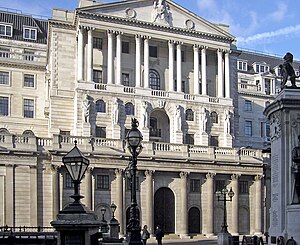 Image via Wikipedia
Image via WikipediaSearching questions were raised about banks’ role in society at a packed public meeting organised by the Ecumenical Council for Corporate Responsibility (ECCR), the UK-wide church-based research and advocacy group, in Birmingham yesterday evening. Chaired by Rt Revd David Urquhart, Anglican Bishop of Birmingham, the panel discussion marked the launch of ECCR’s new report The Banks and Society: Rebuilding Trust. Introducing the panel, Bishop David Urquhart told the meeting that as a society we need to ask the right questions about our financial system in order to make economic life as good as possible.
Presenting the new report, Suzanne Ismail of ECCR highlighted financial exclusion, the financing of environmentally destructive projects, and lack of transparency as key challenges – and opportunities – facing the banks. ‘ECCR’s report helps show what a more socially responsible banking sector would look like,’ Ms Ismail said.
Also on the panel were Damon Gibbons of the Centre for Responsible Credit and the Better Banking Campaign and Professor Andy Mullineux of University of Birmingham Business School and its Centre on Household and Savings Management. Damon Gibbons highlighted responsibility in lending, financial exclusion, financial education and help with debt as key banking-related issues in the UK context. Professor Mullineux said he thought that current agreements between the banks and the government were not sufficiently in the long-term interests of taxpayers and consumers. Revd John Paxton of ECCR West Midlands, speaking in place of Revd Dr Giles Fraser of St Paul’s Cathedral, who was unable to attend due to train service disruptions, urged the meeting to consider the values and principles that society should look for in its banks. ‘What is a bank for, and who should it serve in society?’ he asked.
A wide-ranging discussion followed, with people in the audience – including many members of the West Midlands business and academic communities, churches and the voluntary sector – raising concerns about the impacts of the banking crisis on local and regional economies and ordinary people. As the event drew to a close, there was broad agreement that society can and should expect considerably more from the banks in reciprocating the huge taxpayer support that they have benefited from not only during the recent crisis but before and since.
ECCR’s report, The Banks and Society: Rebuilding Trust, is sponsored by London-based CCLA Investment Management, published in association with a Better Banking Campaign and available for download. ECCR has submitted the report to the UK Government’s Independent Commission on Banking, whose second round of consultation is due to begin following publication of its interim report in April.


